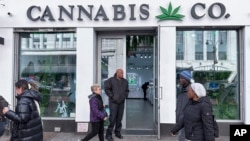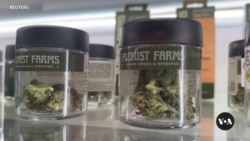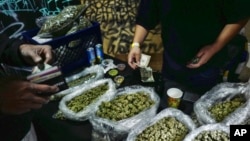Marijuana use is a rare consensus issue in politically divided America, with polls showing that 88% of Americans support at least partial legalization. But neither of the two main presidential contenders are capitalizing on this, advocates say, with both President Joe Biden and former President Donald Trump landing far behind where most Americans are on the issue.
VOA spoke to cannabis advocates on the sidelines of a rare, recent policy summit on the issue, held annually in Washington as a preview to a weekend-long music festival.
“One thing [both candidates] have in common is that their track records on cannabis have been inconsistent and incremental,” said Caroline Phillips, organizer of the National Cannabis Policy Summit. “We've heard promises from both administrations, neither of which have panned out in full.”
Biden in 2022 directed the Department of Health and Human Services to take a key step toward legalization by ordering a review of its classification of marijuana as a dangerous controlled substance, on par with heroin and LSD.
Nearly a year later, the body recommended moving marijuana to a lighter classification, alongside prescription drugs. That ruling now sits with the U.S. Drug Enforcement Administration, which has the power to act.
But, Phillips said, many advocates seek the full removal – or “de-scheduling” – of the substance from the DEA’s Controlled Substances Act.
“They have given us great signals that they're willing to shift towards de-scheduling, but most likely re-scheduling,” she said of the Biden administration. “However, we haven't quite seen the action to back up their words.”
Re-scheduling puts marijuana on par with prescription drugs and regulates users’ access to it; de-scheduling removes it from the list of controlled substances entirely.
Neera Tanden, director of Biden’s Domestic Policy Council, said the administration sees a need to learn more – something that re-scheduling the substance would enable by making it more readily available to scientific researchers.
“There's been a lot of change on this issue for several years,” she told VOA. “It's important for us to be able to research it more effectively.”
A small but vocal group of anti-cannabis legislators in Congress have also expressed concerns about changing the status of marijuana. Last year, 14 of them – all Republicans – sent a letter opposing the effort to loosen its classification.
In their letter, the group pointed to the potential for addiction and the increased potency of today’s cannabis, saying “facts indicate that marijuana has a high potential for abuse and that the risk is only increasing.”
Trump’s position on marijuana, advocates say, is hazy. The pro-legalization Marijuana Policy Project says he “never brought the issue up proactively” as president. Since leaving office, Phillips said, “we've heard him both say that people who sell drugs in the illicit market should be jailed and even put to death.”
On the campaign trail, Trump has largely avoided the issue, said Morgan Fox, political director for the National Organization for the Reform of Marijuana Laws, known as NORML.
“We haven't heard too much from the Republican nominee so far,” he said.
The personal becomes political
The candidates’ attitudes, Fox said, are out of step with those of many Americans, and lean on old tropes about marijuana that paint users as prone to mania – like in the 1936 film “Reefer Madness” – or use fear as a tool, like the 1980s-era Drug Abuse Resistance Education program.
"Luckily, with the advent of the internet and the development of a lot more communication around these issues, people have not only been able to see that the policy of prohibiting cannabis and criminalizing cannabis consumers is nonsensical, but they've also been able to really see the human impact that it has had,” he said.
For entrepreneur William Davis, this is personal. With his pressed jeans, alligator-skin boots, crisp white cowboy hat and penchant for replying to questions with “yes, ma’am,” he knows he does not cut the figure of a stereotypical cannabis user.
“It's a lot of people that you would never think,” he said.
For years, the Iraq war veteran struggled with PTSD and opioid addiction. He was reluctant to accept a friend’s recommendation that he try cannabis, he said, because to him it evoked a wildly popular 1980s ad that showed a frying egg, and a stern admonition: “This is your brain on drugs.”
“Like in a hot pan with the egg, I thought, ‘Nah, I don’t wanna try drugs, I’m gonna fry my brains,’” Davis said.
Instead, he said, marijuana produced a revelation. Davis says he uses CBD, the non-psychoactive compound found in marijuana, to soothe his anxiety during the day, and the active component, THC, for relaxation after work.
Six years ago, he founded a company, Euphoria Eats, that sells infused hot sauce and barbecue sauce.
Davis, who is from Houston but now lives in solidly Republican Louisiana, said he supports legalization for business reasons.
“Until this will be decriminalized and legal everywhere, there will always be hesitant individuals who are afraid to put their money into a lucrative business that they see is making money, that they see is making an impact on the community,” he told VOA.
'My vote influences cannabis laws'
Polls show that the greatest pro-cannabis momentum comes from younger Americans.
Community organizer Scotty Smart spoke to VOA about his position as a young progressive, which was summarized neatly on his moss-green T-shirt that read: “MY VOTE INFLUENCES CANNABIS LAWS.”
“I think cannabis is an issue that ignites and excites young people to pay attention,” said Smart, who works with the nonpartisan New Georgia Project and with a pro-marijuana education and awareness movement called We Want all the Smoke.
A key factor that young voters are watching for, he said, is whether the Biden administration moves forward with the process of downgrading cannabis.
“Hopefully that takes place before the election so we can really see, have something to go off of and not just have election speeches giving us hope,” he said.
Maya Tatum, former chair of the national grassroots group Students for Sensible Drug Policy, agreed that the candidates’ actions matter more than their words. Neither man, she said, is a clear winner here.
“A lot of the young voters that I'm around are wanting to hold Joe Biden accountable for what he said,” in support of cannabis, she said. “I don't personally feel like there's a lot that Trump is offering as it relates to cannabis.”
Fox said NORML would like to see political aspirants be more open about cannabis on the campaign trail.
“Any candidate that actually wants to get ahead – whether it's in the presidential election in Congress or state legislatures or local legislators – if they ignore this issue, it's going to be at their peril,” he said.
Veronica Balderas Iglesias contributed to this report from Washington.








